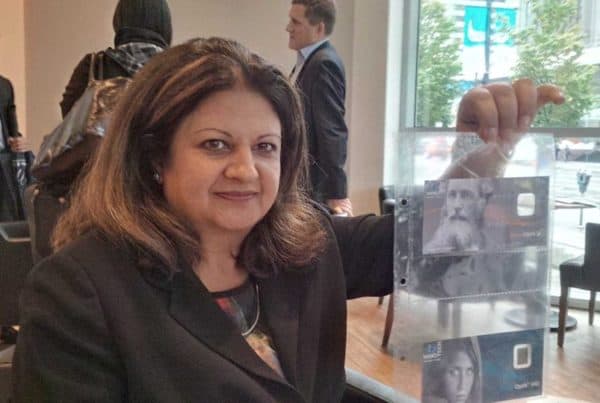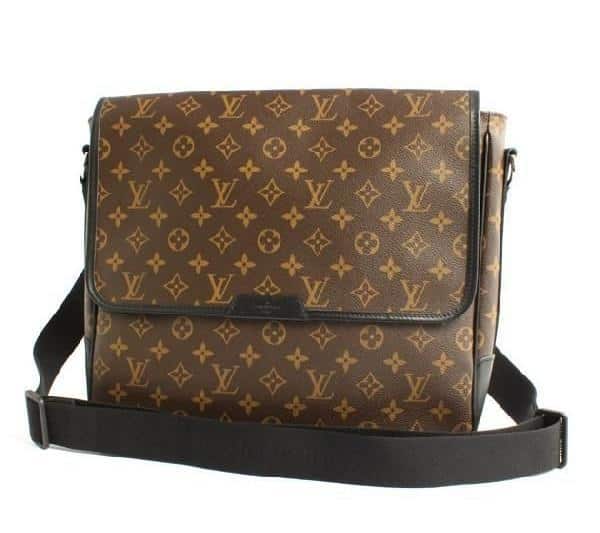Ex-BlackBerry exec Frenny Bawa revels in challenge of Nanotech Security

She spent eighteen months, she says, catching up on a decade’s worth of lost sleep, neglected friends and lapsed family relationships.
When the itch came back, as it almost always does with those accomplished enough to rest on the laurels but too young to actually hang it up, ex-Research in Motion exec Frenny Bawa says she wasn’t overwhelmed by what she saw.
“I spent a lot of time looking,” she explains over coffee in the shadow of Vancouver’s Bentall buildings. “But nothing impressed me.”
Nothing, that is, until she talked to Doug Blakeway, in July of last year. Blakeway, some readers will recall from our profile in May of last year, is the Simon Fraser University Entrepreneur in Residence who himself was taken with some technologies that came to him through his position. The technology, which uses surface plasmonic physics of light waves to collect and reflect concentrated light to develop products intended sell into the authentication and anti-counterfeiting market, belonged to a decades old firm called Nanotech, and Blakeway became its CEO.
Bawa says the initial market for Nanotech’s technology is the counterfeiting market, where the company’s technology offers a marked improvement on even the currently futuristic-seeming Canadian banknotes.
Bawa says talking to Blakeway was the first time she was stirred by the technology, but the timing wasn’t right.
“Taking a look at where the company was in terms of its existence, I told Doug he wasn’t ready to build a team yet. He begrudgingly agreed”.
What followed was more sleep, more catching up with friends, and more family, who by this time might have been forgiven for hoping the restless, energetic Bawa might actually latch on to something.
Then, in February of this year, the phone rang. It was Blakeway. He was ready. Nanotech had a peer reviewed article in the journal Nanotechnology that illustrated how the technology could be used in commercial scale roll-to-roll printing, and had made valuable contacts in that space.
In April, Bawa joined as Chief Commercial Officer. Her experience at BlackBerry, she explained, was what Nanotech needed as it entered commercialization.
“It came down to one word: “channels”, she says. ”My immediate assessment was that Nanotech needed to determine its channel to market”.
Bawa knew about commercializing a product with mass potential. The Ugandan-born exec began at Research in Motion in 2005, and was immediately tasked with expanding the company’s global footprint outside the U.S. Recall, if you will, the BlackBerry maker of this era had locked down Wall Street and the enterprise, but hadn’t really made a dent in the consumer market.
Over the next seven years, Bawa led more than 600 carrier and non carrier partnerships in more than 175 countries, moving BlackBerry from just 26 countries before she began.
She recalls taking the BlackBerry Pearl to the U.K., where Paris Hilton was spotted with a pink version of the phone. “There was some debate about whether we would produce a pink Blackberry”, she says. “In my mind there was no question.” Bawa was insistent that the company accommodate the interest that was growing in the device, which had become a staple celebrity fashion accessory in the years before the iPhone arrived. That was the first time Blackberry got hot with the consumer market, she points out.

Nanotech is unlikely to be championed by Paris Hilton, but Bawa says she will be taking lessons from her BlackBerry experience over to the fledgling company. Nanotech will need to have a razor sharp focus as it rolls out, she explains. Despite a recent $4.2-million financing, resources are scarce compared to Blackberry and the company will have to plot its move to market carefully.
Bawa says the initial market for Nanotech’s technology is in counterfeiting, where the company’s technology offers a marked improvement on even the currently futuristic-seeming Canadian banknotes.
“Look at the watermark on the current notes”, she says, pulling a Canadian twenty dollar bill from her purse. “Look at the way the light hits it. The colors aren’t differentiated”. Surprisingly, she explains that these new notes are already being counterfeited.
Bawa says what Nanotech offers is a genuinely disruptive technology in the $650-billion annual counterfeit market. With Nanotech, she says, products will have KolourOptik® that operate at the nanoscale level, can manipulate light at a nanoscale, and produce vibrant distinct colors. The result is a product that is virtually impossible to counterfeit.
Bitcoin may dominate financial headlines, but there are still 140-billion banknotes produced per year, around the world. It’s a hefty number, even allowing for the inevitable slow erosion to a paperless economy. By that time, says the Nanotech CCO, the company’s secondary channels will be activating.
There are 120-million passports produced every year. There is the lucrative coin market. There are pressing needs in the pharmaceutical business. And ultimately the jackpot lies in consumer goods, which the company thinks will ultimately comprise about half its revenue. Think iPhones and Louis Vuitton bags and Chanel Perfume, all of which are counterfeited en-masse.
My next question is interrupted by the trill of Bawa’s phone. She glances at down at her BlackBerry, but lets the call go to voicemail, an increasingly familiar result for those on the other end of the line these days. Bawa will be getting back to friends, family and sleep somewhere around 2018, I reckon.
_______________
Nick Waddell
Founder of Cantech Letter
Cantech Letter founder and editor Nick Waddell has lived in five Canadian provinces and is proud of his country's often overlooked contributions to the world of science and technology. Waddell takes a regular shift on the Canadian media circuit, making appearances on CTV, CBC and BNN, and contributing to publications such as Canadian Business and Business Insider.
